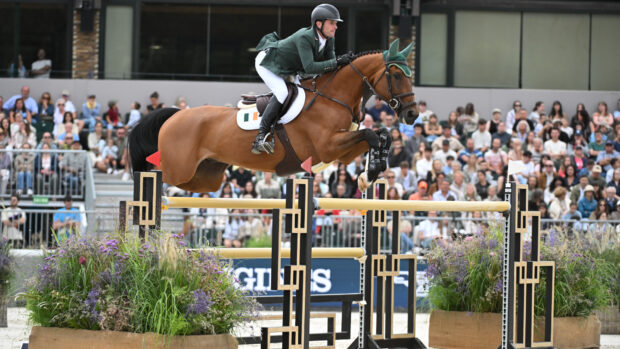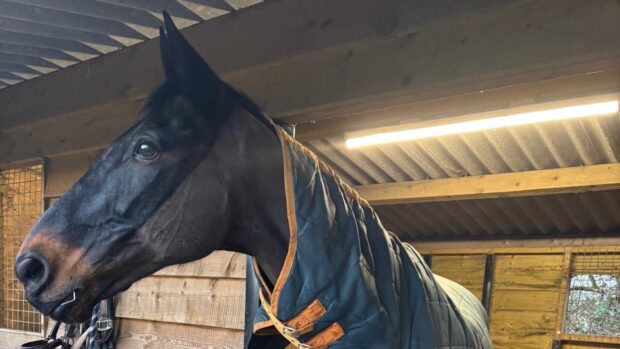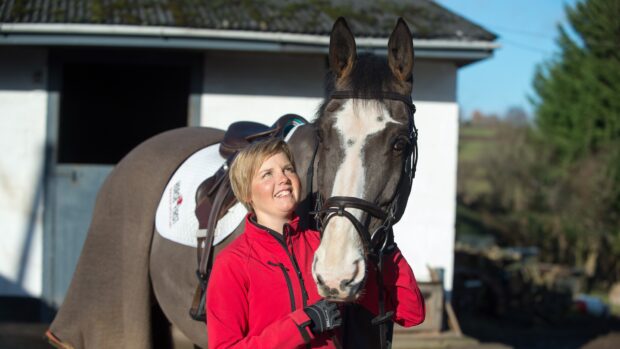The FEI and Tokyo organisers are planning how equestrian sport at this summer’s Olympic and Paralympic Games can safely work in light of the pandemic.
FEI medical committee chairman Mark Hart spoke about the questions facing horse sport, the International Olympic Committee (IOC) and the organising team, at the FEI eventing risk management seminar on 23 January.
Dr Hart said many of the questions they face ahead of Tokyo are “going to be applicable to any large equestrian competition”.
These include local conditions in the host country, people travelling from infected areas and athletes not necessarily being based in their home nations, making it a “huge administrative issue to tackle”.
“Accreditation is probably going to be more limited than it ever has before; [the organisers] want to keep everybody away from the athletes unless those people absolutely need to be there,” said Dr Hart.
“We are going to have to discuss owner accessibility to the riders or stables, if we want to keep our athletes safe, our teams intact and not a chance of any exposure from the outside, we are really going to have to change the processes.”
Article continues below…
You might also be interested in:

Pace picked up on Tokyo plans and preparations *H&H Plus*

Pledge for ‘safe and secure’ 2021 Tokyo Games as fight to control pandemic continues
Yoshihide Suga has pledged that the rescheduled Olympics and Paralympics will be ‘safe and secure’, while key figures have echoed

Subscribe to Horse & Hound magazine today – and enjoy unlimited website access all year round
While the IOC has said vaccinations are not going to be required, other ideas mooted include some form of health passport, how bubbles could work, with team training and testing within those, mini-quarantines and questions about how people travel to the event site.
Equestrian-specific issues also include the extra challenge of having more than one venue, with the cross-country held away from the main heritage zone, at Sea Forest Park, as well as integral key support personnel.
“Somebody who is a track and field [athlete], you could probably interchange some of their support personnel, but if we have a horse/rider combination and the groom tests positive and has to be quarantined, how do we replace a groom?” Dr Hart said, adding that a similar question applies to farriers and vets.
“What happens if we lose two judges [to positive tests]? How are we going to go on? It’s going to change the dynamics of having replacements there.
“It takes months ahead of time to have people on the lists, so how are we going to rapidly change accreditation and where are they going to be? Do we fly them in from the outside or are they going to be on site? So there’s a whole host of Covid-related issues around that for us to think about.”
The update came days ahead of IOC president Thomas Bach reiterating the committee’s commitment to delivering the Games this summer.
“We are fully concentrated on and committed to the successful and safe delivery of the Olympic and Paralympic Games Tokyo 2020, starting on 23 July with the Olympic Games and 24 August with the Paralympic Games,” he said following the IOC’s executive board meeting on 27 January.
“In the last couple of days, we had consultation calls with the international federations and the national Olympic committees, also getting reports from the athlete representatives.
“We could experience there today, again, that all of them are fully united and committed; all 206 national Olympic committees, all the international federations and the athletes are standing behind these Olympic Games. We see the same commitment on the Japanese side with the Japanese government, the organising committee and the Japanese Olympic committee.”
Dr Hart also gave a general update on the pandemic, its impact on equestrian sport and what has — and has not — worked.
“[Covid-19] has probably been the biggest disrupter to our sport in our generations,” he said.
“The pandemic affects not only our individual lives, but how we interact professionally with the sport. This is going to be going on for probably another year at least, so I think it’s important to understand the concepts of Covid and how we can interact to help our sport stay as active and safe as possible.”
He took the meeting through spread prevention measures used in equestrianism and wider society, and how, on the whole, those in the sport have risen to their responsibilities.
“What has worked? We’ve not had any reports of super-spreader events, which is really good,” said Dr Hart.
“It’s taken a lot of work from the organisers and I think equestrian sport has done a really good job with complying with it. Different national federations have had additional safety measures, it’s really gone well.
“What hasn’t worked? We have had some instances of positive reports and it usually has come from social gatherings, whether they are parties or other activities that took place during the competition, that’s where we are linking back all the reports of positive cases. The FEI headquarters has engaged those organisers, helped them figure out where the problems were and made sure that doesn’t reoccur.”
Horse & Hound magazine, out every Thursday, is packed with all the latest news and reports, as well as interviews, specials, nostalgia, vet and training advice. Find how you can enjoy the magazine delivered to your door every week, plus options to upgrade to access our H&H Plus online service which brings you breaking news as it happens as well as other benefits.



